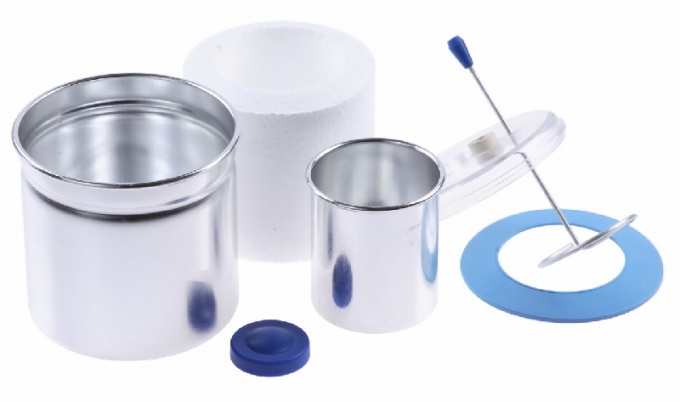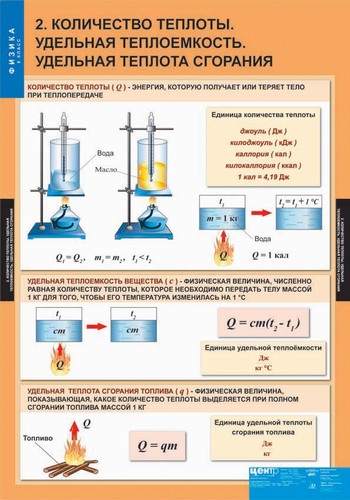Instruction
1
The specific heat capacity of a substance is the quantity of heat required to heat or cool 1 kg of substance by 1 Kelvin. That is, in other words, if for example the specific heat of water is equal to 4.2 kJ/(kg*K) means that in order to heat one kg of water by one degree, you must pass this kg of water is 4.2 kJ of energy. Specific heat of a substance is given by:
C = Q/m(T_2-T_1)
Unit of specific heat capacity has the units in the system SI – (j/kg*K).
C = Q/m(T_2-T_1)
Unit of specific heat capacity has the units in the system SI – (j/kg*K).
2
The specific heat of a body is determined experimentally by using a calorimeter and thermometer. A simple calorimeter consists of a polished metal Cup, then put inside the other metal of glass tubes (for heat insulation) and filled with water or other liquid with known specific heat capacity. Body (solid or liquid), heated to a certain temperature t, is immersed in a calorimeter where temperature is measured. Let the test lowering of the body temperature of the liquid in the calorimeter was equal to t_1, and after the temperature of the water (liquid) and lowered into it the body will be equal, it will be equal ?.

3
From the law of conservation of energy it follows that the heat Q given to the heated body, equal to the amount of heat Q_1 obtained with water, and Q_2 obtained by the calorimeter:
Q=Q_1+Q_2
Q=cm(t- ?), Q_1=c_1 m_1 (?-t_1), Q_2=c_2 m_2(?-t_1)
cm(t- ?)= c_1 m_1 (?-t_1)+ c_2 m_2(?-t_1)
here m_1 and c_1 - specific heat and mass of water in the calorimeter, and c_2 m_2 - specific heat and mass of the material of the calorimeter.
This equation expresses the balance of thermal energy, is called the equation of thermal balance. He will find
c=(Q_1+Q_2)/m(t- ?) =( c_1 m_1 (?-t_1)+ c_2 m_2(?-t_1))/m(t- ?) = (c_1 m_1+m_2 c_2)( ?- t_1)/m(t- ?)
Q=Q_1+Q_2
Q=cm(t- ?), Q_1=c_1 m_1 (?-t_1), Q_2=c_2 m_2(?-t_1)
cm(t- ?)= c_1 m_1 (?-t_1)+ c_2 m_2(?-t_1)
here m_1 and c_1 - specific heat and mass of water in the calorimeter, and c_2 m_2 - specific heat and mass of the material of the calorimeter.
This equation expresses the balance of thermal energy, is called the equation of thermal balance. He will find
c=(Q_1+Q_2)/m(t- ?) =( c_1 m_1 (?-t_1)+ c_2 m_2(?-t_1))/m(t- ?) = (c_1 m_1+m_2 c_2)( ?- t_1)/m(t- ?)
